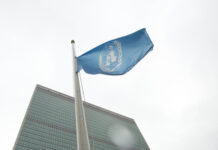Photo credit: DiasporaEngager (www.DiasporaEngager.com).
The Jewish community in the embattled region of Gondar, Ethiopia is preparing for the world’s largest Passover Seder this year, with nearly 4,000 Ethiopian Jews residing in camps and awaiting immigration to Israel expected to attend.
Over 80,000 matzot have been baked by members of the community over the past several weeks in preparation for the holiday, Jeremy Feit, the president of the Struggle to Save Ethiopian Jewry (SSEJ) aid group, told The Algemeiner. A smaller Seder, with almost 1,000 attendees, will take place in the capital of Addis Ababa.
The Jewish holiday of Passover, which celebrates the Biblical story of the Israelites’ escape from slavery in Egypt, will begin next Monday evening and end the following Tuesday.
Past Passover Seders in Ethiopia have provided attendees a rare opportunity to partake in the traditional feast, offering some their first ever taste of meat — a luxury they could not otherwise afford. But according to Feit, food price hikes of 50 percent to 100 percent have meant that this year’s feast will largely consist of potatoes and eggs.
“With the extreme price increases and the resulting hunger, the community will feel the intensity as they pray to celebrate the Seder next year with their families in Jerusalem,” Feit said.
The Seder comes on the heels of an airlift of medical supplies for the beleaguered community, facilitated by SSEJ. Ten pallets of aid were delivered to a medical clinic established by the group a year ago in Gondar, serving 3,300 children and 700 elderly. The aid was dedicated in memory of former US Sen. Joe Lieberman, who served as SSEJ’s honorary chairman and who passed away during the weeks-long airlift operation.
SSEJ, which is based in the US and entirely volunteer-run, is the only provider of humanitarian aid to Jews in Ethiopia. The group aims to mitigate some of the hunger ravaging the community by providing more than 2.5 million meals per year, prioritizing very young children, pregnant and nursing women, and students at a local yeshiva, who Feit said were often “so hungry they would faint in class.”
SSEJ and its leaders have assisted around 60,000 Ethiopians immigrate to Israel, more than the total number brought to the Jewish state during its storied military operations in 1984 and 1991.
According to Feit, some 13,000 Jews still remain in Ethiopia. Recent years have seen several hundred Ethiopian Jews immigrate to Israel at a time, especially during periods of violent civil strife, but even that trickle has dried up following the brutal Oct. 7 attack by Hamas on southern Israel.
“The average person in Gondar and Addis Ababa has been waiting to make aliyah for 20 years,” Feit said, using the Hebrew term for immigration. “They left their villages with the thought that Israel was going to bring them in. And they’ve been left since as internally displaced refugees.”
Feit said the decades-long wait is especially painful for those with first-degree relatives in Israel, and is further compounded for those with relatives serving in the Israeli military.
“Jews in Ethiopia are extremely concerned about their [family members’] welfare as the IDF [Israel Defense Fores] battles Hamas terrorists” in Gaza, he explained. “They are especially concerned given the vastly disproportionate number of Ethiopian Jewish soldiers killed in Israel during the current conflict.” Jews in Ethiopia, he averred, comprise “one of the most Zionist communities in the world.”
Since Oct. 7, there has been no indication as to how many Ethiopian Jews will be brought to Israel and when. Those with relatives in Israel were struck with another blow when Israel’s economy took a hit following the Hamas onslaught, and many of those who rely on remittance from their loved ones in Israel stopped receiving money.
“This has left the Jews in Ethiopia in a dire situation, with food and medical care hard to come by. Living in squalor, without access to clean water, electricity, or even bathrooms, the malnourished Jews in Ethiopia suffer untold horrors,” Feit said.
Despite the grim depiction, Feit struck a more positive note about the upcoming holiday.
“Given that most of the year they’re feeling despair at their lack of redemption, at least Passover is a time to celebrate the possibility of redemption and reunification,” he said. “Being able to celebrate with thousands of their friends and family members in a joyous celebration of Passover is a welcome relief.”
Source of original article: World – Algemeiner.com (www.algemeiner.com).
The content of this article does not necessarily reflect the views or opinion of Global Diaspora News (www.GlobalDiasporaNews.com).
To submit your press release: (https://www.GlobalDiasporaNews.com/pr).
To advertise on Global Diaspora News: (www.GlobalDiasporaNews.com/ads).
Sign up to Global Diaspora News newsletter (https://www.GlobalDiasporaNews.com/newsletter/) to start receiving updates and opportunities directly in your email inbox for free.
































